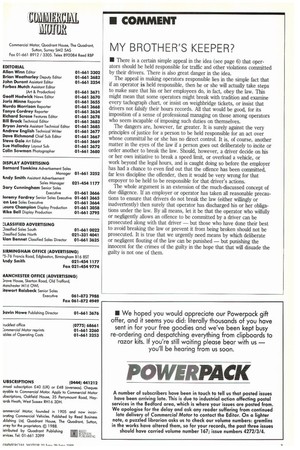MY BROTHER'S KEEPER?
Page 5

If you've noticed an error in this article please click here to report it so we can fix it.
• There is a certain simple appeal in the idea (see page 6) that operators should be held responsible for traffic and other violations committed by their drivers. There is also great danger in the idea.
The appeal in making operators responsible lies in the simple fact that if an operator is held responsible, then he or she will actually take steps to make sure that his or her employees do, in fact, obey the law. This might mean that some operators might break with tradition and examine every tachograph chart, or insist on weighbridge tickets, or insist that drivers not falsify their hours records. All that would be good, for its imposition of a sense of professional managing on those among operators who seem incapable of imposing such duties on themselves.
The dangers are, however, far greater. It is surely against the very principles of justice for a person to be held responsible for an act over whose committal he or she has no direct control. It is, of course, another matter in the eyes of the law if a person goes out deliberately to incite or order another to break the law. Should, however, a driver decide on his or her own initiative to break a speed limit, or overload a vehicle, or work beyond the legal hours, and is caught doing so before the employer has had a chance to even find out that the offence has been committed, far less discipline the offender, then it would be very wrong for that empoyer to be held to be responsible for that driver's actions.
The whole argument is an extension of the much-discussed concept of due diligence. If an employer or operator has taken all reasonable precautions to ensure that drivers do not break the law (either willingly or inadvertently) then surely that operator has discharged his or her obligations under the law. By all means, let it be that the operator who wilfully or negligently allows an offence to be committed by a driver can be prosecuted along with that driver — but those who have done their best to avoid breaking the law or prevent it from being broken should not be prosecuted. It is true that we urgently need means by which deliberate or negligent flouting of the law can be punished — but punishing the innocent for the crimes of the guilty in the hope that that will disuade the guilty is not one of them.
















































































































































